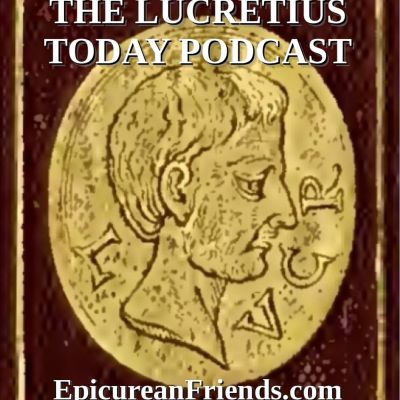Lucretius Today is a podcast dedicated to learning Epicurean philosophy through study of the poet Lucretius, who lived in the age of Julius Caesar and wrote "On The Nature of Things," the only complete presentation of Epicurus' ideas left to us from the ancient world. We'll walk you line by line through the six books of Lucretius' poem, and we'll discuss how Epicurean philosophy can apply to you today. In this podcast we won't be talking about modern political issues. How you apply Epicurus in your own life is entirely up to you. Over at the Epicureanfriends.com web forum, we apply this approach by following a set of ground rules we call "Not Neo-Epicurean, But Epicurean." Epicurean philosophy is not a religion, it''s not Stoicism, it's not Humanism, it's not Libertarianism, it's not Atheism, and it's not Marxism or any other philosophy - it is unique in the history of Western Civilization, and as we explore Lucretius's poem you'll quickly see how that is the case. The home page of this podcast is LucretiusToday...
http://Epicureanfriends.com
Episode 192 - Special Edition - Chapter 16 of A Few Days In Athens
Welcome to Episode 192 of Lucretius Today. This is a podcast dedicated to the poet Lucretius, who wrote "On The Nature of Things," the only complete presentation of Epicurean philosophy left to us from the ancient world. Each week we walk you through the Epicurean texts, and we discuss how Epicurean philosophy can apply to you today. If you find the Epicurean worldview attractive, we invite you to join us in the study of Epicurus at EpicureanFriends.com, where you will find a discussion thread for each of our podcast episodes and many other topics.
This week most of our podcasters are unavailable, so to prevent there being a gap in our release schedule, we are releasing this week a special reading of Frances Wright's Chapter 16, her concluding address (as a fictional statement by Epicurus) about the damage that arises from supernatural religion.
This episode comes with a caution: Frances Wright does not seem to agree with Epicurus' view of the benefits of thinking about how we are not alone in the universe, and how we benefit from the thought that there are indeed natural beings -- living deathless and painless but not supernatural lives -- not here, but far out in space. Epicurus states clearly in the letter to Menoeceus that non-supernatural beings do exist somewhere in the universe, but Frances Wright downplays this, and she instead focuses her attention almost exclusively on Epicurus' rejection of supernatural gods.
Most of the divergence I am describing can be reconciled, but everyone should read Epicurus and Lucretius and Philodemus for themselves to find out what the ancient Epicureans had to say about non-supernatural gods.
The main thrust of what Wright says about the damage that arises from supernatural religion seems entirely consistent with Epicurus' own views, and I hope this chapter spurs you to further reading yourself from the ancient Epicurean sources.
